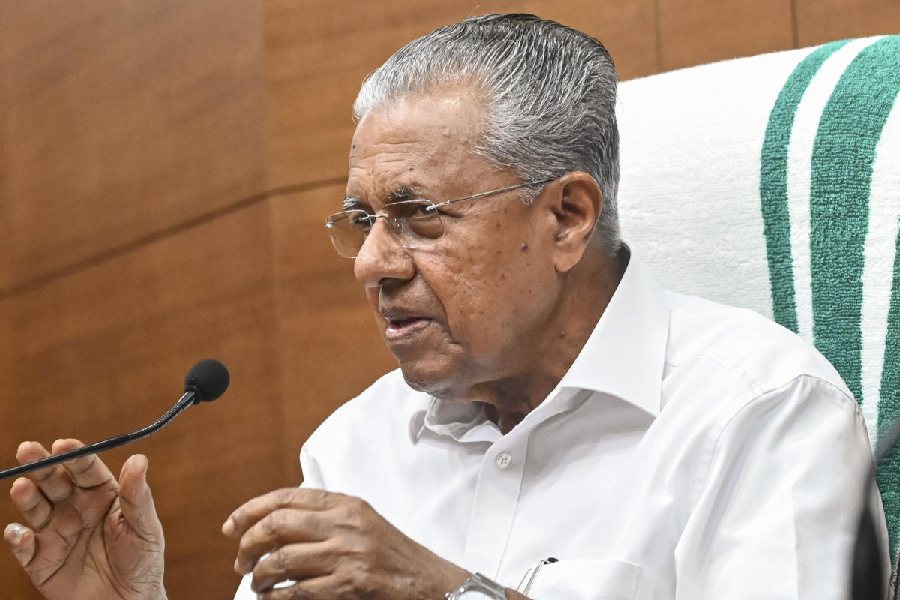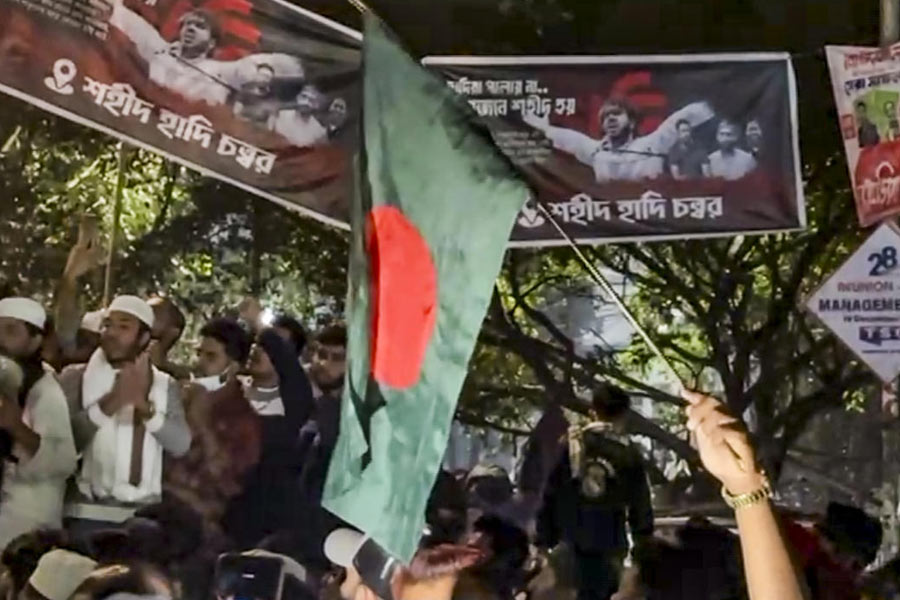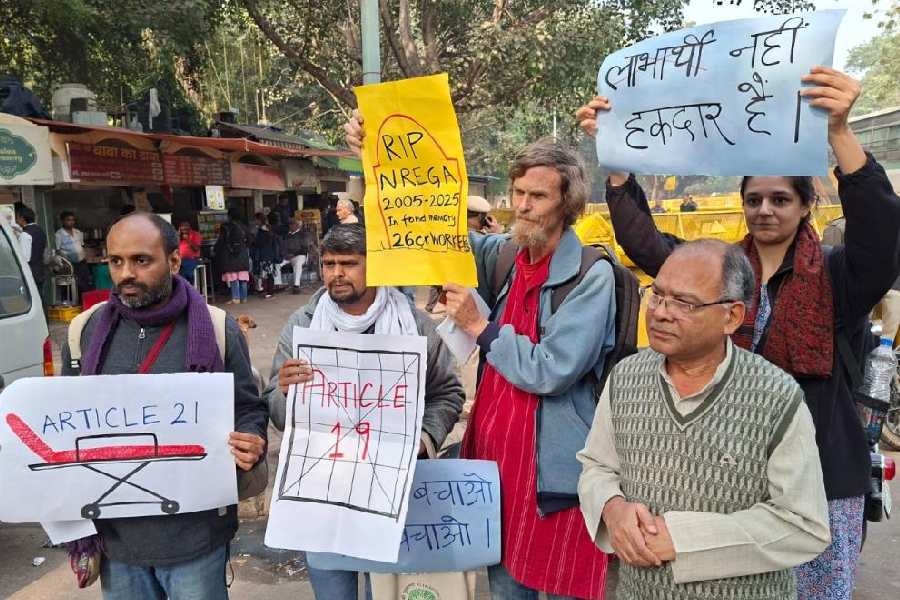 |
| Chandra Shekhar Ghosh |
Calcutta, April 3: Chandra Shekhar Ghosh easily straddles disparate worlds.
He is just as comfortable beating his way through a dust bowl of remote villages befriending poor folk as he is in discussing arcane issues with the high rollers of finance.
When Ghosh learnt that the microfinance institution he started in 2002 had been picked as one of two recipients of a hugely coveted full-fledged bank licence after a gruelling assessment by the RBI, he didn’t show great elation.
There was just a quiet sense of satisfaction — and a desire to re-dedicate himself to the causes he has espoused since 1985 when he chose to abandon the familiar cocoon of a family business and committed himself to working with the poor and the underprivileged through an NGO.
It’s a world that seems far away from his state-of-the-art office at Salt Lake’s Sector V with its imposing, glass-fronted buildings that house some of the biggest names in the corporate world: IBM, Wipro and Cognizant.
Bandhan is a world that is built on the small ambitions of its customers and oodles of trust; it is bound by a skein of relationships that ripple through 22 states and is wedded to the dual objectives of poverty alleviation and women’s empowerment.
Ghosh is a man who has never been limited by boundaries. Literally so. He was born in a small village in 1960 but soon popped along to Bangladesh with his family. He went on to complete his masters in statistics at Dhaka University.
“Since 1985, I have worked with more than 25 NGOs in the remotest parts of Bangladesh and Bengal — regions where banking services were never available,” he says. He used to flit between Bangladesh and India early in his career. “But after 1995, I cut back on all that travel,” he says.
“It is during those journeys that I found that when poor village folk were desperately short of cash, they turned to relatives or moneylenders. I realised that I needed to do something to free them from the clutches of the sharks. That’s how the idea for Bandhan first came. I threw my job and started an NGO and immediately faced strong objection from my wife and in-laws. But I was determined; I wanted to see where this road would take me.”
Bandhan was floated as an NGO in 2001. It soon spawned two branches in Bagnan and Konnagar. “We now have 2,016 branches across the country,” says Ghosh.
“I chose Konnagar because I have a residence there and Bagnan because of the presence of many MFIs (microfinance institutions) and cooperative societies in the region. These two places offered an ideal opportunity for microfinance lending,” says Ghosh.
But the biggest challenge was to raise the money that would spread the concept of micro-lending among poor farmers and artisans in the country.
“Funding was really the big challenge. We had to build our credibility first before banks would consider providing funds,” says Ghosh.
The big break came when the Small Industries Development Bank of India (Sidbi), the government-owned institution established in 1990 to fund micro, small and medium enterprises, decided to fork out funds to Bandhan.
“They gave us Rs 20 lakh,” remembers Ghosh. Soon, the Bandhan founder was petitioning global institutions like the International Finance Corporation (IFC) to put up money to sustain Bandhan’s operations.
Ghosh’s commitment to his dream won them over. IFC, and later Sidbi, picked up equity in Bandhan Financial Services Pvt Ltd. Today, the micro-lending institution gets money from 34 banks and financial institutions.
“A charitable cause underpins the workings of an NGO. I didn’t find that sustainable. I quickly realised that if I had to broaden my reach and expand my operations to cover the whole country, I would have to start a microfinance institution,” he says.
But some MFIs have earned a bad name in the past few years. It was necessary to focus on nitty-gritty; and to sweat the small stuff. It paid off. By the end of 2013-14, Bandhan will have earned a net profit of Rs 250 crore.
Bad loans are a nightmare for any lender, big or small. Bandhan has been careful to ensure that it doesn’t overextend itself or strain the repayment capacities of borrowers. That’s why Bandhan’s bad loans have been capped at less than 1 per cent — a big factor that weighed in its selection for a banking licence.
“A large part of our success is due to our 13,000-strong employees, most of whom are drawn from the villages,” says Ghosh.
“It has taken us a long time to build this trust; and we intend to cement this further when we start the banking business,” he adds.
Ghosh believes that as a bank, Bandhan will be able to expand operations by mobilising deposits and bringing a wide range of banking services to rural folk in the unbanked regions in the country.
“We have already started a geo-mapping process to identify the branches feasible for banking services,” Ghosh says.
Did he have any mentors?
Ghosh names Sir Fazle Hasan Abed, a Bangladeshi social worker and the founder and chairperson of BRAC, the world’s largest NGO with over 100,000 employees. Ghosh had worked with BRAC in his early days. “Much of my development in this field has been with his guidance,” he adds.
With 802 branches in Bengal, Bandhan’s bank licence also augurs well for financial inclusion in Bengal. The poor rural folk will now be able to park their surplus cash with a bank rather than be drawn to the fly-by-night operators who have spawned a myriad shady, deposit-taking institutions in violation of all rules.
“This is definitely a great step for financial inclusion in Bengal. They have a significant presence in the state and if they can convert their existing branches into bank branches, it will boost financial inclusion,” said Sanjay Arya, executive director of UBI, the SLBC convenor bank in Bengal.
Ajit Kumar Maity, chairman of the city-based microfinance institution, Village Financial Services, where Ghosh had a brief stint, said: “I found him to be a very hardworking person. This is the main reason for Bandhan’s success. The award of a bank licence to Bandhan offers a ray of hope to several other MFIs which can now hope to become banking entities in the future.”










